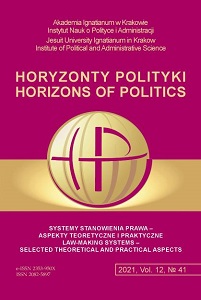Westbindung czy Zentralmacht? – polityka zagraniczna współczesnych Niemiec w perspektywie konstruktywistycznej
Westbindung or Zentralmacht? – Contemporary German Foreign Policy From a Constructivist Perspective
Author(s): Krzysztof C. MatuszekSubject(s): Political Theory, Government/Political systems, International relations/trade, Politics and Identity, Identity of Collectives
Published by: Uniwersytet Ignatianum w Krakowie
Keywords: Germany; foreign policy; national identity; the West; the central power;
Summary/Abstract: RESEARCH OBJECTIVE: The aim of the article is to analyze the determinants of the contemporary German foreign policy. According to the constructivist approach, these determinants lie mainly in the way in which the nation perceives itself through the opinion-forming elite, because its identity determines what is considered possible, appropriate and permissible in foreign policy. THE RESEARCH PROBLEM AND METHODS: The article adopts a constructivist approach, according to which the shape of a state’s foreign policy is determined not so much by objective factors, such as military and economic potential, but by the way in which a given political entity interprets itself and its environment. THE PROCESS OF ARGUMENTATION: I analyze the intra-German discussion on the new shape of German foreign policy from the point-of-view of Poland as a country interested in maintaining the unity of the West. From this perspective, the decisive question is whether the German attachment to the idea of the West still holds. Referring to one of the standard textbooks of German foreign policy and selected monographs, I confront two German self-images: that of a Western democracy and that of a European central power. RESEARCH RESULTS: A state’s strategic goals are determined by the national identity, so it is necessary to see how Germans perceive themselves. Contemporary German identity is not uniform, but is the subject of internal ideological and political disputes. CONCLUSIONS, INNOVATIONS, AND RECOMMENDATIONS: It is in Poland’s interest that Germany defines itself as a liberal democracy belonging to the family of Western countries, and not as a European central power or a “power in the center.”
Journal: Horyzonty Polityki
- Issue Year: 12/2021
- Issue No: 41
- Page Range: 123-137
- Page Count: 15
- Language: Polish

